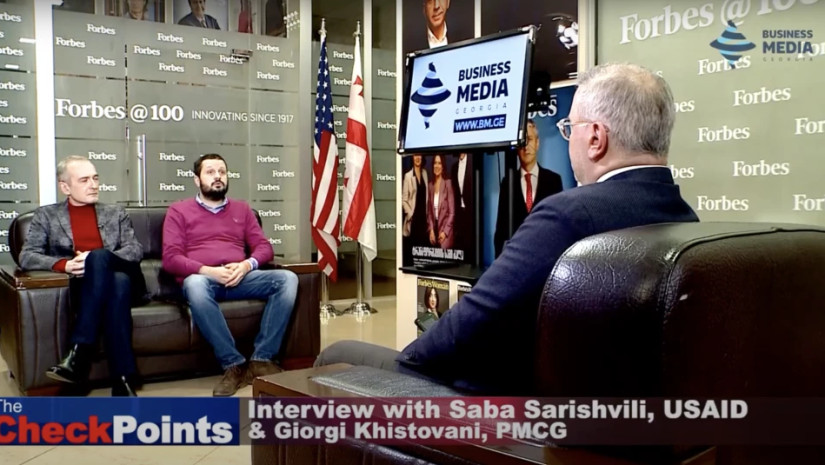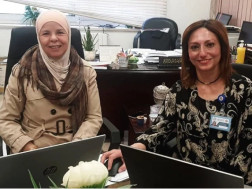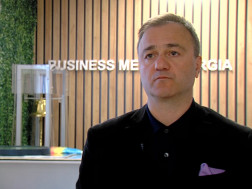Diversification on the EU market is not an easy task, and it needs modern skills that match the modern development of the technological age. USAID and the Georgian business leaders are working together to identify and build the skills of the workforce. By matching the skills demanded by businesses with workforce training, employees and businesses both win with higher value jobs and more productive, competitive businesses. This week, USAID launched the Business Leaders Council as part of its industry-led skills program. By working hand in hand with Georgia's private sector, USAID will ensure the private sector plays a leading role in steering the program so that it generates innovative solutions inspired by Georgia's private enterprises from growing economic sectors. The CheckPoints sat down with Saba Sarishvili, USAID, and Giorgi Khistovani, PMCG to find out more.
Giorgi Isakadze: Saba, let me start with you. We're talking about a newly established new program coming from USAID, which is an industry-led skill development program. Can you evaluate a bit more about the purpose of this program?
Saba Sarishvili: The purpose of our program is to help the development of the skills sector and vocational training sector in Georgia. We simply want and our objective is to have a supply at the labor market, meeting demand. And as far as demand is created by employers, by the private sector, our priority is to support and have the private sector engaged in skills development actively and sustainably. So this is the objective of our program and as the main instrument, we have a grant fund, which is 13,000,000. At the same time, we have technical assistance available as well for our beneficiaries. We have three components. And under these three components, we have different grant schemes. So component one is aimed at facilitating engagement of the private sector because we realize that skills development is not their core business for employers. This is something that is coming from the need. With our support and our funds, we are trying to reduce the risk which is connected to the engagement in the new field. This is the aim of component one. Here we have relatively small grants with a maximum amount per grant project of 30,000 USD with a contribution requirement from the grantee which is 20%, including cash and in-kind. Under component two, we are already talking about development, improvement if there is a need and the implementation of training programs. We have two subcomponents, one dealing with short term training courses meaning less duration, less than six months, and long term more than six months. We have a grand scheme different from the component one with a maximum amount for the first subcomponent 300,000 USD per project. And for the long-term programs 1.5 million USD per project from our side as our investment and we require 1 to 1 contribution again, including cash and in-kind. Under component three in order to help inclusiveness and access of rural population and regional population to high-quality skills development opportunities, we support replication of existing training programs in regions. Under region, we mean any location on the territory of Georgia except for five self-governing cities. For component three, when we are talking about replication of existing training programs in a rural area, the maximum amount per grant project is half a million US dollars from our side. And contribution is the same as for component 2, it's 1-1, including cash and in-kind. In general as far as it's about economic development, so the main part of the economic development is private sector development, right? So, talking to our businesses, we discovered that they all are talking about a lack of professional skills.
Giorgi Isakadze: Goga, I had the privilege to attend the launching, of the newly established Business Council where you present PMCG. Firstly, tell me a bit more about the partnership with the program.
Goga Khistovani: In this case, PMC supports the program, establishment, and functioning of the Business Leaders Council. The program had a great idea to establish this Consulting Council, where business leaders can contribute to the successful implementation of the program by recommending participating in the program implementation in a way that they are observing, evaluating the program implementation, getting feedback from the program management team and at the same time are bringing the voice of the business into the program implementation. I mean that it was great that USAID and the group which is representing decided to have constant communication with businesses in the process of designing the program and implementing the program. And PMCG plays the role of a facilitator in the process and supporting the program in the process of bringing together business leaders, getting their voice into the program implementation, and addressing their concerns in a way that we will in total in this year, conduct four meetings. And between the meetings, we want to dig deeper into the questions, concerns, recommendations which were highlighted during the meetings and then have different instruments in use. I mean, we want to invite different guest speakers mainly from the state authorities. We also want to make this discussion between state authorities responsible for the education, business sectors and educational institutions make the program work better. We and our colleagues saw this challenge that the business works differently, the private sector works differently, and educational institutions are also unique entities. And so it's very important to help them to make their collaboration more efficient. And this council, as a unit or as an institution, should support to make this collaboration more efficient.
Giorgi Isakadze: While mentioning digging in various directions, I think you already succeed in one of them while representing major trends of the labor market. What are the key findings depicted in the presentation you did through the first meeting of the Business Council?
Goga Khistovani: We observed the post-covid reality and realized that there are more people willing to work. The labor force is growing, there are more vacancies, there are more job opportunities. There are more businesses that want to hire. And not that we only think so. We have evaluated data from Jobs.ge Main website for vacancies. We are conducting a business survey, where we see together with the Business Association of Georgia whether businesses are willing to hire or not. And at the same time, we are using data from Georgia Statistics Office about the labor force participation rates and we see there that actually everything suggests that the employment rate should increase. But surprisingly the opposite is happening. the employment rate is decreasing unemployment rate is increasing. And one of the main reasons behind this is, in our opinion, the so-called skills mismatch and that the people with specific skills whom businesses are looking for are not there or people with. We see that from businesses who are saying that they have difficulties to make their business, more than 40% are saying that they lack skilled specialists. In all sectors, the results are almost the same. Talking with businesses, we see that surprisingly, for instance, the trade sector faces huge difficulties not only to find people with skills but to find people where not so high skills are required. Why? Because people from trade sector were moved because of various reasons and we can discuss this further when if necessary, but they are leaving the sector and there is an obvious need for low skilled people in the service sector, also the trade sector and somehow educational sector and businesses by themselves have to address it. We need this program, as Saba already highlighted in detail, there are a lot of opportunities for every business representative company to use this vehicle to address those challenges.
Giorgi Isakadze: What should be the results of these joint efforts through this program, where you will definitely say that this was one of the most successful programs where all stakeholders were not just engaged, but all the KPIs that were set up, were all met successfully?
Saba Sarishvili: Of course, it's important for the program to meet all the targets set by indicators. We will be meeting these targets and we have, let's say, some particular targets in terms of trained people, in terms of employment and so on and so forth. But what I want to underline and what could be, let's say, one of the important results of this program will be success stories about private sector engagement in the skills development field which can be replicated in the future - successful engagement and sustainable engagement. Satisfied businesses are the best promoters of this engagement and the success stories are the best promotion tools. Another result that I would like to see is an improved partnership between the private sector and training providers. This is a challenge right now at this stage. And it's it requires quite significant efforts to improve. But I hope that the program will make its contribution to this process because it's very important right now, training providers and especially colleges and businesses, they speak a different language.
Goga Khistovani: I like and I'm happy that in Georgia, finally, we are our international partners, but also the some of the state agencies and the not maybe the majority of people living in Georgia, but a big number of people understood that business sector is the sector which can move forward the country. This is very important to understand and this is very important to highlight everywhere. This program is so important because there is a clear understanding that only a strong business sector can make Georgia wealthier. At the same time, I'm very happy to see that in the educational sector there are certain changes. For instance, the establishment of vocational skills agency which are giving businesses the opportunity to contribute or lead the process in skills development. Because now the running changes are focused on increasing the role of the business sector and business associations in developing new programs and supporting new kinds of educational structures and educational programs. I think that it's perfect timing for this program to on the one hand to make clear to businesses that it's their time now. Time to Act. At the same time, any financial incentive to act helps here a lot. We need best practices. We need successful cases where concrete businesses can showcase that it's possible to collaborate with training providers. It's possible to act as skills developers for their interest and of course, for the interest of the whole economy because nobody can guarantee now that if I educate you, you will stay forever in my company and you will move forward. And so I think that successful cases, I agree with Saba, are necessary.
















